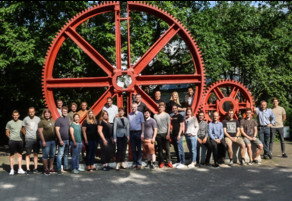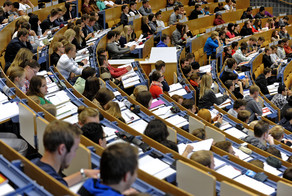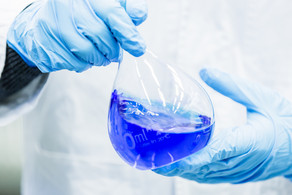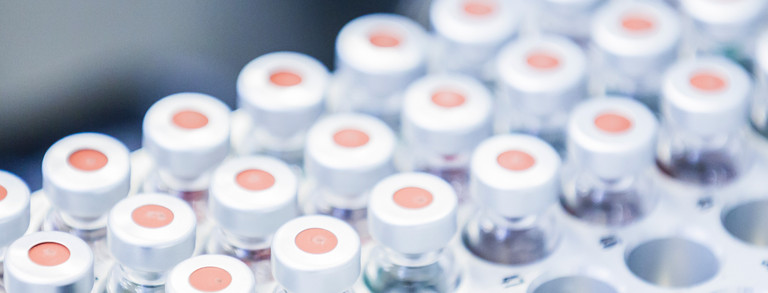PD Dr.-Ing. Christoph Held
In my habilitation I worked on the thermodynamics of bioreactions. My group focused specifically on the reaction equilibria of enzyme-catalyzed reactions that are industrially relevant. The influence of concentrations, temperature, pressure and additives (e.g. ionic liquids) on the reaction equilibrium could be revealed. For this purpose, the ePC-SAFT equation of state was used to model reactant and product activity coefficients, which allowed predicting reaction equilibria which were afterwards validated experimentally.
After my habilitation in “Thermodynamics of Bioreactions”, I continued my research on fundamentals of chemical thermodynamics, and I was also involved in research activities in the field of rotating packed bed machines (RPB) through my time as a substitute professor of fluid separations.
Thermodynamics of reactions and electrolyte systems
Modeling electrolyte systems with ePC-SAFT
In the field of thermodynamics, my group has focused on complex electrolyte systems, especially the thermodynamics of non-aqueous electrolyte systems. Here we have further developed the ePC-SAFT model (developed by Prof. Sadowski) with the goal to fully predict thermodynamic properties and phase equilibria of electrolyte systems. We also focused on the phase behavior of material systems in which a component before melting. We have used new methods to determine melting properties and used them, for example, to predictively model solubilities. Building on this expertise, we are measuring and modeling equilibria (e.g. solubility) in various areas, e.g. to screen materials for polymer recycling, for ion extraction from aqueous media, and for CO2 separation from various media. We are also investigating the influences of electrolytes on the equilibria and kinetics of chemical reactions. In all of these works, the focus is on depicting molecular effects as accurately as possible with physical models in order to enable model predictions (which we then validate experimentally). This offers the most predictive modeling and optimization options possible usable for researchers in the field of reactions and separation.
Rotating Packed Beds (RPBs)
In the field of rotating packed beds (RPB, established at TUDo by Prof. Górak) we are specifically investigating the separation operation absorption, and we are currently looking at the absorption of CO2 in RPBs with different solvents. The aim of the work is to understand the RPB machines in more detail in order to make them economical for industrial applications. To do this, we vary operating parameters and internals (e.g. packings, liquid distributors) to optimize hydrodynamics and separation efficiency, and compare the results with conventional separations.
Projects
Cosolvent and Substrate Influence in Enzymatic Catalyzed Reactions for Production of Fine Chemicals
Enzyme-catalyzed reactions are used in industry, but the equilibrium and kinetics of such reactions are still often limited. The oxidation reaction of the formate anion catalyzed by formate dehydrogenase is investigated in this project as a model system for a pressure-induced switchable reaction systems towards production of either the fine chemical NADH or for CO2 conversion.
Microfluidics for Structure-Reactivity Relationships Aided by Thermodynamics & Kinetics
The relationships between reactant structure, co-solvents, catalyst, and their respective reactivity in esterification processes is a research area that crosslinks thermodynamics, kinetics and chemical engineering. It is the goal of this project to predict the influence of solvent, concentration, and catalyst on the kinetics and equilibria of esterification reactions by thermodynamic modeling.
Projects
In literature co-solvent and co-solute effects on thermodynamic reaction equilibria of only a few enzymatic reactions were studied so far. In most cases the reaction media is pure water or a low concentrated buffered solution. This simplification of the highly non-ideal solutions present in cells leads to a lack of information and understanding of these complex systems. As a first approach to understand these complex interactions, this work is focused on the prediction of co-solvents and co-solute effects on the reaction equilibria of enzyme-catalyzed reactions.
Aim of this work is to thermodynamically describe single reaction steps of the glycolysis metabolic pathway for which current works fail to explain its occurrence.
The aim of this work is the further development of ePC-SAFT towards quantitative model predictions for mixtures containing ionic liquids.
Aim of this work is the prediction of amino-acid and peptide solubility in aqueous and organic systems with PC-SAFT using new experimental melting properties from fast scanning calorimetry (FSC).
The development of innovative chemical processes for CO2 conversion into useful platform chemicals, which are in return used as raw materials, has become significantly important for the industry. Since recent methods suffer from the formation of environmentally harmful salt as a waste product, a new salt-waste free method with a coupled C-H carboxylation, subsequent esterification and recycling of the inorganic base overcomes the problems of the unsustainable standard process.[1,2]
The aim of this work is to investigate the influence of different solvents, pressure and concentration of the reaction agents on the phase and reaction equilibria, as well as the kinetics of the coupled C-H carboxylation and esterification reactions.
Coacervate systems are a special kind of Aqueous Two-Phase Systems, but they are thermodynamically not well described. In this work, phase equilibria of coacervate systems are measured an modeled using polyelectrolyte PC-SAFT. Further, enzymatic reactions in such coacervate phases are investigated.







